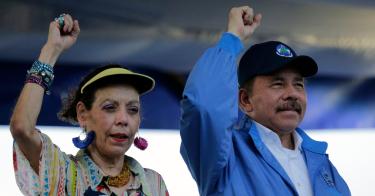In 1979, socialist guerrilla leader Daniel Ortega led his Sandinista National Liberation Front in overthrowing the authoritarian regime of Anastasio Somoza, whose family had held power in Nicaragua for more than four decades.
Ortega has held power there now for 26 of the past 42 years, wielded significant political influence in his years out of power, and is up for reelection for his fourth consecutive five-year term in November.
Cracking down on the political opposition, the Nicaraguan caudillo is determined to hold onto power at all costs.
Ortega initially headed a provisional, unelected Sandinista-led government in Nicaragua for 11 years, from 1979 to 1990. The CIA World Factbook reports that, after democracy was restored, Ortega lost free and fair elections in 1990, 1996, and 2001.
Ortega finally regained the presidency, with only 38 percent of the vote, in 2006, according to Reuters. His reelections in 2011 and most recently in 2016, were marred by voting irregularities and claims of fraud.
As the Guardian reported, the political opposition described the 2016 election as “the most rigged contest in the four decades since the Sandinista leader first came to power.”
In his 15 years in power since 2006, Ortega—along with his wife, Rosario Murillo, who has been vice president since 2017—has amassed complete control over the government, the security forces, the media, and key sectors of the economy.
Since 2018, the country has been locked in a political crisis provoked by the Ortegas’ brutal tactical response to peaceful anti-government protests. Several senior officials in the authoritarian regime have been sanctioned by the U.S. government for corruption and violations of human rights.
Nevertheless, Ortega, 75, and Murillo, 70, are laying the groundwork to win another five-year term in office in this year’s elections in November. Writing in The Miami Herald, Andres Oppenheimer described the Ortega-Murillo strategy to prevail again this fall as simply to “ban the opposition.”
By the end of June, The Washington Post reported, the Ortega regime had charged and arrested all of the major opposition presidential candidates on the left and the right, including the leading candidate, Cristiana Chamorro, the daughter of still-popular former President Violeta Chamorro.
Nicaragua is the second-poorest country in the Western Hemisphere, after Haiti. The Heritage Foundation’s annual Index of Economic Freedom has recorded steadily lower scores for the country since Ortega returned to power in 2006 and began to reimplement his socialist policies.
The Index reports:
Nicaragua’s economy remains mostly unfree this year [2021] as it has been for more than a decade.
If market-based democracy is ever restored in Nicaragua, the first step needed to resuscitate economic freedom will be a complete overhaul of the country’s rule-of-law institutions to protect property rights, establish a transparent and reliable judicial system, and expunge the many forms of corruption that flourish under an authoritarian and socialist system.
In the meantime, the Biden administration has imposed additional sanctions in the wake of the June arrests. It can, and should, take further steps to inflict economic consequences on the regime, as should the other Western powers.
The deeply corrupt and barbaric Ortega-Murillo dictatorship is far worse than the Somoza dictatorship the Sandinistas overthrew more than four decades ago.
The Nicaraguan people are suffering not only from weak rule of law and a lack of economic and political freedom, but from the government’s denial of their basic individual liberties and human rights.
Lee Edwards, an expert at The Heritage Foundation on communism, has cited Ortega as a prime example “of the lust for power and control that characterizes socialism.”
The Biden administration has taken some steps, but it needs to dig deeper into the U.S. diplomatic, legal, and financial toolbox to ramp up the pressure until the Ortegas are gone.
This piece originally appeared in The Daily Signal



